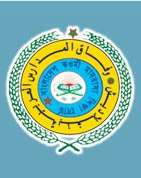Befaqul Madarisil Arabia Bangladesh
|
Befaqul Madarisil Arabia Bangladesh | |
| Formation | April 1978[1] |
|---|---|
| Type | Nongovernmental Education Board, [Islamic Seminaries] |
| Legal status | Board |
| Purpose | Educational |
| Location |
|
Region served | Bangladesh |
Official language | Bengali, Arabic |
Chairman | Allama Shah Ahmad Shafi |
Secretary General | Mawlana Abdul Jabbar |
Deputy Secretary General | Mawlana Abul Fatah Muhammad Yahya |
Key people | Allama Shah Ahmad Shafi |
Main organ | Majlis-e-Shura, Majlis-e-Amela |
| Affiliations | +20,000[1] |
| Slogan | رَبِّ زدْنيِ عِلْماً (Arabic) |
| Website |
www |
Befaqul Madarisil Arabia Bangladesh (Bengali: বেফাকুল মাদারিসিল আরাবিয়া বাংলাদেশ) is the largest qawmi madrasa education board in Bangladesh. it was founded in April,1978 after a seminar of Islamic scholars.[2][3] This organization of Qawmi Madrasahs of Bangladesh is also known as the "Befaqul Madaris" (also transliterated as Wafaq ul Madaris).[4] It is an extension of the process that formed the Wafaq ul Madaris Al-Arabia, Pakistan in 1957.[5] "Bangladesh Qawmi Madrasah Education Board" is the largest federation of Islamic seminaries in Bangladesh. Qawmi educational system practices originate from the traditional Muslim educational system of Bangladesh. At present, there are more than 65,000 Qawmi Madrasahs in Bangladesh.[6] As of 2013, more than 20,000 Seminaries across the Peoples Republic of Bangladesh are affiliated with "Befaqul Madaris".[1][5] It controls all the seminaries which are run by Deobandi School of thought. Deobandi School of thought is supposed to be the most powerful and dominated school of thought in Bangladesh.
Sheikh ul-Islam Allama Shah Ahmad Shafi, one of the decieples of Husain Ahmed Madani and the present rector of Al-Jamiatul Ahlia Darul Ulum Moinul Islam Hathazari, Chittagong, Bangladesh; is the chairman of "Bangladesh Qawmi Madrasah Education Board".
Objectives and functions
| Part of a series on |
| The Deobandi movement |
|---|
 Darul Uloom Deoband, India |
| Ideology and influences |
| Founders and key figures |
| Notable institutions |
| Centres (Markaz) of Tabligh |
| Associated Organizations |
| Militant Organisations |
The board was founded to assure a standardized curriculum and to provide centralized examination. Membership with the board is voluntary, though required for degree accreditation by the Befaqul Madaris.[5]
The main functions of the federation are: registration of Madrasahs, creation of syllabus, checking standard of education, arrangement of examination and issuance of degrees.
Notable institutions
The following are some of the notable Qawmi Madrasahs in Bangladesh:
- Al Jamiatul Imdadia, Kishorganj, Bangladesh.
- Al-Jamiatul Ahlia Darul Ulum Moinul Islam
- Jamiah Islamiah Hussainia Gohorpur
- Al-jamiatul Arabia Lil Baneena Wal Banaat Haildhar Anwara
- Jamia Tawakkulia Renga Madrasah
- Jamiatul Uloom Al-Islamia Lalkhan Bazar - also known as Lalkhan Bazar Madrasah
- Jamia Qurania Arabia Lalbagh
- Al-Jamiah Al-Islamiah Patiya
- Al-Jamiatul Arabiatul Islamiah, Ziri
- Karimia Nurul Ulum Madrasah, Zummapara, Rangpur
- Jamia Shariyyah Malibagh, Dhaka
- Jamia Rahmania Arabia Dhaka
- jamia Darul Ma'arif Al-Islamiah Chttagong
- Ummahatul Muminin Girls Madrasah, Vatara Mor,Gulshan,Vatara,Dhaka.
- Jamia Madania Baridhara,Gulshan,Dhaka.
- Jamia Faqihul ummah Madrasa, Manda, Mugda, Dhaka.
- Jamia Sahbania Darul Uloom, Dhaka
See also
- Hefazat-e-Islam Bangladesh
- Bangladesh Madrasah Education Board
- Education in Bangladesh
- Islam in Bangladesh
- Religious education
- Dars-i-Nizami
References
- 1 2 3 "Information" (PDF). befaq-bd.com. Retrieved 9 May 2014.
- ↑ "What Do Bangladesh's Deobandi Qawmi Madrasas Want?". wikileaks.org. Retrieved 8 May 2014.
- ↑ "Microsoft Word - Bangladesh Madrasah Study FINAL.doc" (PDF). Retrieved 24 February 2011.
- ↑ "Hefazat-e-Islam: A united front for a divided lot". Retrieved 8 May 2014.
- 1 2 3 "undergraduate - curs - orange 021 & pantone 234" (PDF). Archived from the original (PDF) on 27 July 2011. Retrieved 24 February 2011.
- ↑ "Testimony of Samina Ahmed to U.S. Senate Foreign Relations Committee - International Crisis Group". Crisisgroup.org. 19 April 2005. Archived from the original on 3 March 2011. Retrieved 24 February 2011.
